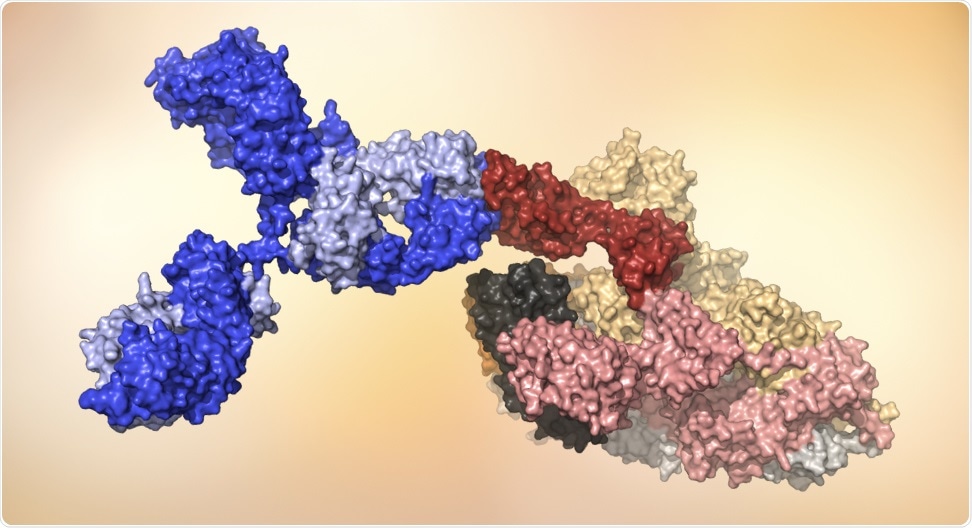A new study has shown that potent antibodies against severe acute respiratory syndrome coronavirus 2 (SARS-CoV-2) could help protect against COVID-19 infection. Preliminary results in animal studies have so far proven successful. The study titled, "Isolation of potent SARS-CoV-2 neutralizing antibodies and protection from disease in a small animal model," was published in the latest issue of the journal Science.
At present, the COVID-19 pandemic has no cure, and there are no vaccines that can prevent this infection. To date, it has already killed over 441,000 individuals across the world and many have suffered from severe and life-threatening critical illness due to this infection.
Plasma from those who have recovered from the infection is said to contain "neutralizing antibodies (nAbs)." The researchers write that these antibodies could help treat critically ill patients with COVID-19 by aiding their immune system to fight the infection. These antibodies could also form the basis of a potential vaccine to prevent the infection among the vulnerable population, the researchers explained. Some nAbs have "outstanding potency," and these are termed "super-antibodies." These can be obtained by "deeply mining antibody responses of a sampling of infected donors," they wrote.
This study was undertaken to see if isolating highly potent nAbs against SARS-CoV-2 could protect models of small animals against the infection.
What was done?
Team of researchers led by Scripps research along with a team at and University of California San Diego School of Medicine included a group of participants who had recovered entirely from COVID-19 and had adequate antibodies against the infection. They developed "neutralization assays" to see the level of antibody response among the participants. For this, they used a "high-throughput antibody generation pipeline" and screened over 1,800 antibodies.
At the UC San Diego lab, blood samples of the convalescent patients were collected. At Scripps Research and IAVI, certain test cells were developed. These cells were made to express ACE2 receptors on their surface. This receptor is the one on which the virus binds in order to enter the host cells. To check if the antibodies could stop the entry of the virus, the team isolated over 1,000 antibody-producing immune cells from the blood samples. These were the B cells of the patients. These B cells produce a distinct SARS-CoV-2 antibody. Next, they studied the genetic sequences of the antibodies so that they could make these antibodies in the lab.
For their in vivo tests, they developed a small animal lab model using Syrian hamsters to test if these antibodies could protect against the infection. They isolated potent nAbs against receptor binding domains (RBD) present on the spike protein of the virus (S). These spikes help the virus to attach to the host cell before invading them. The lab-created potent antibodies were screened, and they noted that even small amounts of the antibodies were capable of blocking the virus in the test samples. They also protected the hamsters from heavy viral exposure, wrote the researchers. It took the researchers seven weeks to complete their study. Study co-author Elise Landais, Ph.D., an IAVI principal scientist, said, "We leveraged our institution's decades of expertise in antibody isolation and quickly pivoted our focus to SARS-CoV-2 to identify these highly potent antibodies."

A human antibody (blue) attaches to the receptor binding domain (red) on the SARS-CoV-2 virus. (Model courtesy of the Burton lab.)
What was found?
The results of this study showed that passive administration of the potent nAb to the lab animals provided them with protection against COVID-19 due to SARS CoV-2. This was seen among the tested Syrian hamsters. When the animals were inoculated with the virus and subsequently the nAbs were administered, the load of the virus remained low in the lungs of the animals, and their body weight remained unchanged.
Conclusions and future directions
The researchers wrote, "The study suggests a role for nAbs in prophylaxis, and potentially therapy, of COVID-19. The nAbs define protective epitopes to guide vaccine design."
Co-senior author of the study Dr. Dennis Burton, Ph.D., the James and Jessie Minor Chair in Immunology in the Department of Immunology & Microbiology at Scripps Research, said, "The discovery of these very potent antibodies represents an extremely rapid response to a totally new pathogen."
Co-lead author Thomas Rogers, MD, Ph.D., an adjunct assistant professor in the Department of Immunology & Microbiology at Scripps Research, and assistant professor of Medicine at UC San Diego, said, "It has been a tremendous collaborative effort, and we're now focused on making large quantities of these promising antibodies for clinical trials." "We intend to make them available to those who need them most, including people in low- and middle-income countries," Landais added.
The researchers explained these antibodies from the convalescent patients could be mass-produced using biotechnology methods and could be used not only for treating critically ill patients but also used for the development of vaccines in preventing severe COVID-19 illness among the vulnerable population. The researchers say that this approach has been successful in treating Ebola and respiratory syncytial virus RSV infections in the past.
Burton concluded, "That discovery gives us hope that we will eventually find broadly neutralizing antibodies that provide at least partial protection against all or most SARS coronaviruses, which should be useful if another one jumps to humans."